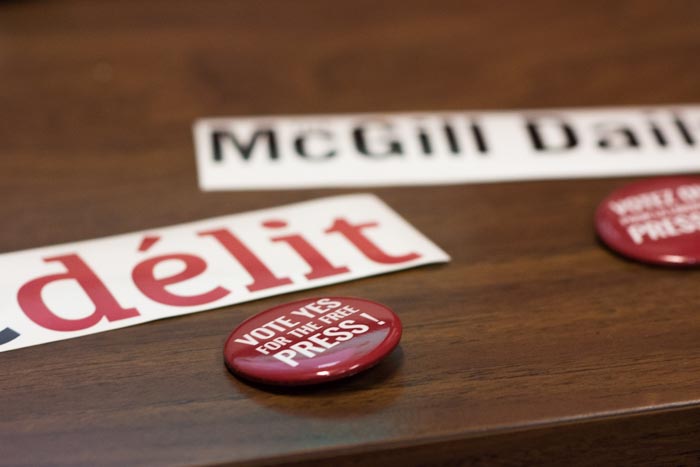Between Nov. 13 and Nov. 17, the Daily Publication Society (DPS), which publishes both The McGill Daily and Le Délit, faced a referendum on the renewal of its Memorandum of Agreement (MoA) with the Students’ Society of McGill University (SSMU). Despite a vocal ‘No’ campaign team calling for a majority vote against its existence, the DPS won the vote with 65 per cent of students voting ‘Yes.’
Every five years, Independent Student Groups (ISG) with mandatory student fees, such as the DPS, must renew their MoA through a referendum of its members. This year, the ‘Yes’ and ‘No’ campaigns—which push for and against the continued existence of the DPS, respectively—fought a particularly intense battle to influence the referendum.
Inori Roy, the Coordinating Editor of the Daily, characterizes the vote as a matter of protecting the freedom of the press.
“[We] believe that it is crucial for us to remain on this campus […] as voices for students who otherwise may not have that much of a voice,” Roy said. “These may be marginalized students, these may be Francophonie students. We think that it is crucial to continue to [provide] a platform.”
At the end of the first day of voting, Elections SSMU released a campus-wide email to both undergraduate and graduate students stating that the ballot would be cancelled and started anew following mistakes in the list of students made eligible to vote in the referendum.
“The elector’s list provided by the DPS omits a number of students within the SSMU, and potentially the Post-Graduate Students’ Society (PGSS) as well,” Elections SSMU wrote.
However, hours after this notification was sent out, the Elections SSMU team followed up with another email clarifying that the DPS was not at fault for the mistake.
“The DPS committed no wrongful action, and the mistake emanated purely from confusion by all parties involved about how to compose electors lists for this question,” Elections SSMU wrote.
Roy stated that she believed this interpretation was correct, and further stated that she was convinced that the “No” campaign had used this event to its advantage.
“I hope that the student body was able to recognize [the mistake] and also to critically engage with the ways the ‘No’ campaign mobilized around what ultimately turned out to be a misunderstanding,” Roy said. “From the facebook page to the pensketch, the ‘No’ campaign has been mistaken in many of their assertions, including our finances and the status of our MoA in the case that we lost the referendum.”
Andrew Figueiredo, a prominent member of the “No” campaign, told The McGill Tribune that he felt that DPS’ publications were not sufficiently representing its members..
“My main concern is that students are currently forced to pay for a paper that has been exclusionary, unaccountable, and divisive,” Figueiredo said. “My number one reason in calling for a ‘No’ vote is because I believe that students should be empowered to demand changes in the DPS and to control where their money goes.”
Figueiredo further explained that, in his opinion, the “No” campaign had successfully illustrated the Daily’s antagonism.
“Specifically, the ‘No’ campaign has highlighted some of The Daily’s more divisive posts and actions, including the closing of their comment section, so that people can see why we need change,” Figueiredo said.
Elections SSMU Deputy Electoral Officer Isaac Levy claimed that Elections SSMU remained neutral on the matter. Since internal DPS by-laws regulate the referendum, Levy explained that, although Elections SSMU would normally consider the “No” stand’s distribution of food at the Y-Intersection contradictory to Article 6.2 of the SSMU Internal Regulations of Elections and Referanda: Campaigning, the incident was outside of its mandate.
“As the issue cannot be sanctioned or regulated under the SSMU campaign rules or guidelines, the question of permissibility depends on what the DPS by-laws for campaigning state,” Levy said.
Levy said that Elections SSMU, which allows ISGs to host their existence referendums on its OnlineVoting System, would look into the establishmentof stricter rules for similar votes in the future.









